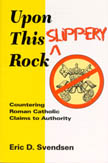 How do you know with certainty your non-Roman Catholic faith is true? I tend to gravitate towards this question- because in college I majored in Philosophy. One of my mentors was a devout skeptic, who similarly repeatedly asked “…how do you know what you know about anything, and how can you be certain you know it?”
How do you know with certainty your non-Roman Catholic faith is true? I tend to gravitate towards this question- because in college I majored in Philosophy. One of my mentors was a devout skeptic, who similarly repeatedly asked “…how do you know what you know about anything, and how can you be certain you know it?”Roman Catholics think that their epistemological problems have somehow vanished by their choice to enter and believe the Roman Catholic Church. My philosophy teachers would have a field day with such a person. It would be very easy for a non-Christian skeptic to tear their arguments on "certainty" to shreds.
Protestants though approach the certainty claims of Roman Catholics a bit differently than a skeptical gadfly. We ask similar questions, but with the purpose of showing that allegiance to an infallible interpreter gives no such thing as absolute certainty. For instance, In his book , Upon This Slippery Rock: Countering Roman Claims to Authority [New York: Calvary Press, 2002], Eric Svendsen asks the following questions:
1. When the Roman Catholic apologist asks, “How do you know your private interpretation of the Bible is correct over against the private interpretation of every other denomination?,” we should respond by asking a question of our own: “How do you know that your private interpretation of Roman documents is correct over against the private interpretation of other Roman Catholics?”
2. When the Roman Catholic apologist asks, “how can you be certain that you are in the truth since all you have to go on is your own fallible private judgment that your church is right?,” we should counter with a similar question: “How can you be certain that you are in the truth since all you have to go on is your own fallible private judgment that Rome is right?”
3. When the Roman Catholic apologist asks, “How do you know you’ve picked the right denomination?, we should respond by asking, “How do you know you’ve picked the right infallible interpreter?”
4. When the Roman Catholic apologist insists that the principle of Sola Scriptura has resulted in 25,000 denominations, we should in turn insist that the principle of Scripture plus an infallible interpreter has resulted in an even greater number of religious cults.
Source: Eric Svendsen, , Upon This Slippery Rock: Countering Roman Claims to Authority [New York: Calvary Press, 2002] 65-66.






1 comment:
These are really good posts.
I owe Drs. Svendsen and White much (to say nothing of Webster & King) for helping me find the answers that my E Orthodox friend was asking me, trying to get me to convert w/ him. It was tough going for a while but it was exactly these arguments that refuted him and satisfied me.
Post a Comment